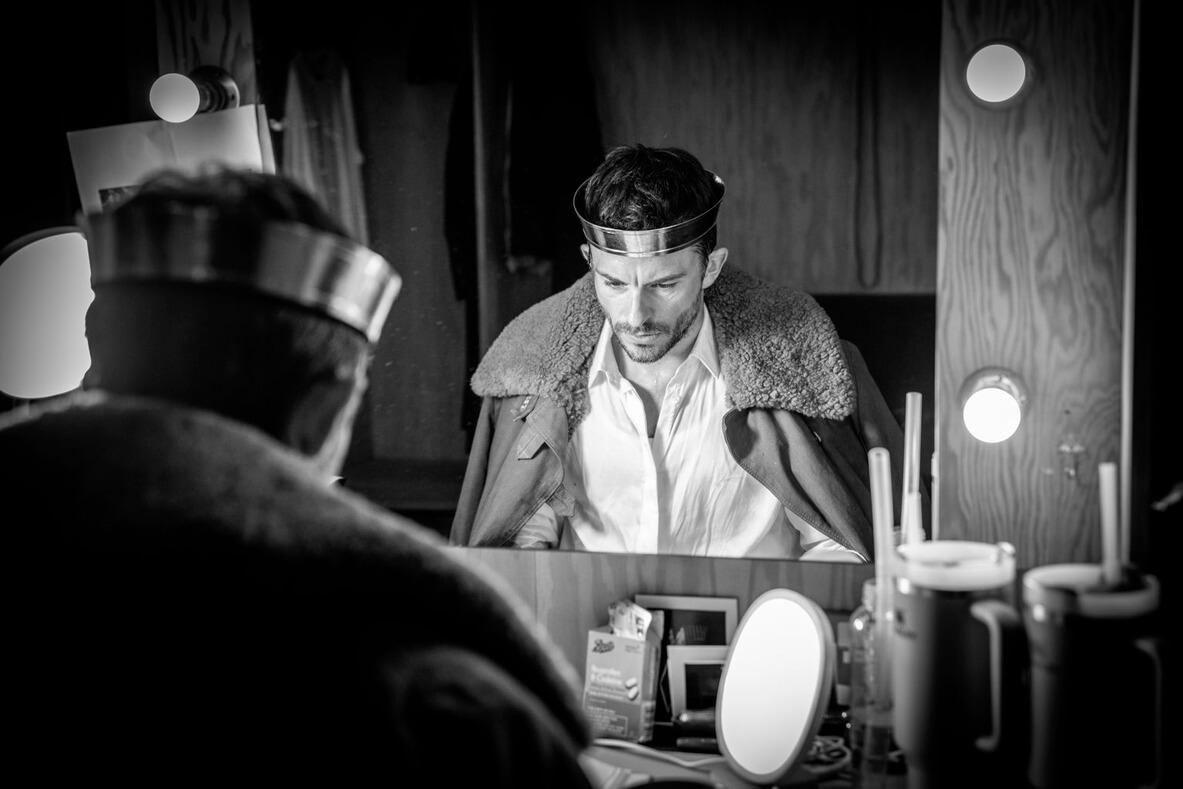However with interval’s every hour or so it’s also as watchable, entertaining and thought provoking as a binge on the finest TV drama box set.
And if it falls short of being era defining, in the way that gay-centric classics like BOYS IN THE BAND, SHOPPING AND FU*KING and especially ANGELS IN AMERICA were, it’s still an extraordinary odyssey into adulthood for its young and beautiful protagonists.
It’s a shame its conclusions are so reactionary, more of that later, but there’s much to enjoy along the way IF you can get a seat, and this one is worth camping out at the box office for in the hope someone returns a ticket.
A group of gay writers struggling to tell their tale invoke the ghost of Edwardian novelist E.M. Forster. He guides them through the process of organising their story and their legacy as modern gay men. He uses as a framework not the narrative of his own man-on-man romance MAURICE (although it’s referred to a lot) but events from his masterpiece HOWARD’S END.
On this occasion young gay Manhattanite, Eric, is our central figure and we discover how he loses one home, lover and purpose in his twenties to find another, and his true identity, in his forties.
Along the way the exceptionally well drawn and engaging satellite characters include his audacious first boyfriend (a playwright, hot-wired to self-destruct) the young actor they take under their wing and who grows to eclipse them, a dying rent boy, political activists, and an older couple who separately effect Eric in fundamental ways. There’s also ghosts, oh and if that weren't enough, a long cameo from Vanessa Redgrave.
It renders itself irresistible to gay men in the first hour by serving up a big slice of lifestyle porn. The stage throngs with the kind of beautiful, witty and literate young gay men who we all imagine we are, once were, or believe ourselves to still be inside - perfect bodies and all.
Having been seduced so completely that you’ll almost roll over with pleasure how you view the following six hours will depend on how familiar you are with HOWARD'S END and how much gay drama you've seen or read.
If you're not familiar with either then everything will take you by surprise and blow your mind in the best way.
If you know the plot of the novel it's a fairly straight forward gay rendering, so you'll always have a good idea of what happens next, although it’s enormous fun to discover how the playwright moulds his characters to the situations in the book.
If you know your queer theatre you'll be expecting an inevitable AIDS monologue (or three) a “My First Sex” monologue and a “We've Lost our Sense of Community Thanks to Grindr” monologue, which are all present and correct.
But there’s also engaging and nuanced dialogue about pretty much every aspect of being young, beautiful, gay and privileged including guilt about being exactly that.
So completely are the characters immersed in their Manhattan gay bubble that for the most part women are utterly irrelevant to the narrative. If they’re mentioned at all they’re usually dead and were abusive, to the point where it seems jarring when a real-life woman (Redgrave on top form) finally makes an appearance to atone for her own abusive past in another long monologue.
I cannot remember the last time I so wanted an interval to end so I could re-engage with characters and their story.
The climax of Play One is heart stoppingly lovely, the directing, production and acting is spare, unindulgent and top class and I cannot remember the last time I so wanted an interval to end so I could re-engage with characters and their story.
Equally satisfying as comedy, drama and debate, highlights for me included a party scene in which liberals discover they’ve a republican in their midst and a hilarious set piece wedding with the gasp-out-loud HOWARD'S END revelation still packing a punch.
American import Samuel. H. Levine gives one of the finest performances I’ve ever seen in the dual role of an actor on the rise and a rent boy succumbing to the depths of despair. But the entire cast is outstanding.
If I can’t award it the full five stars it’s because of my profound disappointment that Lopez doesn't use the opportunity to conclude anything more radical.
Throughout the history of gay drama we have punished the promiscuous characters with self destruction and rewarded the righteousness with heterosexual idylls of monogamous long-term relationships. Lopez does the same. And after thirty years, of rightly exploring the horrors, challenges, injustices and bravery of a health crisis must we STILL primarily define ourselves in relation to AIDS? I was really hoping for something less last-century than that.

 Kyle Soller, Paul Hilton and John Benjamin Hickey in The Inheritance. Photo by Simon Annand.
Kyle Soller, Paul Hilton and John Benjamin Hickey in The Inheritance. Photo by Simon Annand.


 RUTHLESS is a small scale, off Broadway musical from 1992 by Joel Paley and Marvin Laird, with just 6 characters, all of them female, one played by a man in drag. The drag element is a useful way to describing the tone of the piece which presents women not as nuanced 3 dimensional characters but as the kind of grotesques that some gay men like to dress up as and emulate.
RUTHLESS is a small scale, off Broadway musical from 1992 by Joel Paley and Marvin Laird, with just 6 characters, all of them female, one played by a man in drag. The drag element is a useful way to describing the tone of the piece which presents women not as nuanced 3 dimensional characters but as the kind of grotesques that some gay men like to dress up as and emulate.